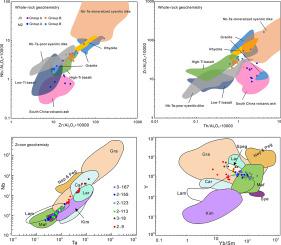International Journal of Coal Geology ( IF 5.6 ) Pub Date : 2024-01-01 , DOI: 10.1016/j.coal.2023.104441 Tianyang Yang , Yulin Shen , Lu Lu , Jun Jin , Wen Huang , Fayue Li , Yunfei Zhang , Jiangchen Hu , Lijun Zeng

|
A number of volcanic ash-bearing layers deposited in the Upper Permian coal-bearing strata on the southwestern margin of the Yangtze Craton are well preserved, and some layers show the enrichment of critical elements such as an assemblage of Zr(Hf)–Nb(Ta)–Ga–REE (REE, rare earth elements). Based on previous work, we studied the source of the Upper Permian volcanic ash-bearing layers widely distributed in western to northwestern Guizhou and the geological factors for the enrichment of critical elements. This article provides a detailed analysis of the mineralogical and geochemical characteristics of the Upper Permian volcanic ash-bearing layers. The mineralogy of the samples is dominated by clay minerals, quartz, anatase, plagioclase, and pyrite, with a few containing K-feldspar, calcite, dolomite, and siderite. The clay minerals are mainly composed of mixed-layer illite/smectite (I/S) and kaolinite. The whole rock geochemistry (Al2O3/TiO2, Nb/Ta vs. Zr/Hf, Nb/Al2O3 vs. Zr/Al2O3, and Th/Al2O3 vs. Zr/Al2O3) and zircon trace elements (Th/Nb vs. Hf/Th, Nb/Yb vs. U/Yb, Ta vs. Nb, and Yb/Sm vs. Y) were used to help determine the source. The results indicate that the sources of the samples include Emeishan high-Ti basalt, intraplate volcanic ash from the Emeishan large igneous province (ELIP), and arc volcanic ash. The critical elements (Zr[Hf]–Nb[Ta]–REE) are mainly derived from the syndepositional intraplate volcanic ash erupted from the ELIP. The results of zircon trace elements and Hf isotope ratios suggest that the magma from the ELIP has gradually evolved from the mantle to the crust, and became more enriched in critical elements such as Nb and Ta. The intraplate volcanic ash from ELIP is the main supplier of critical elements and plays a crucial role in their enrichment through the Late Permian in southwestern China. The paleoenvironment controlled the deposition of volcanic ashes, and most of the critical element enrichment layers developed in weak hydrodynamic environments. The paleogeography and acid rain influenced the migration of critical elements such as Nb, Ta, REE, and Y in some layers. The enrichment of critical elements is also controlled by the regularity and intensity of intraplate volcanic activity.































 京公网安备 11010802027423号
京公网安备 11010802027423号